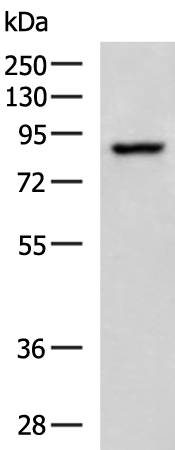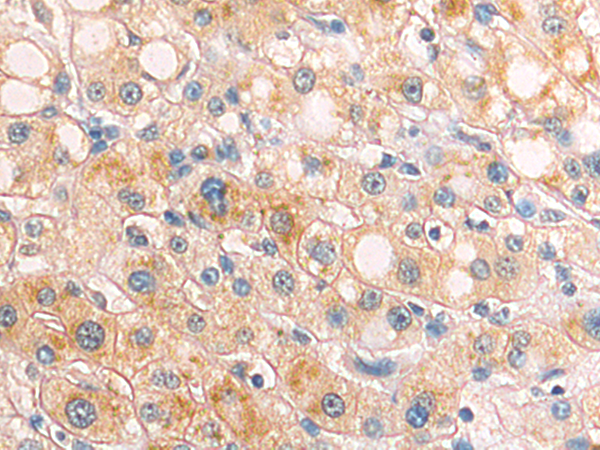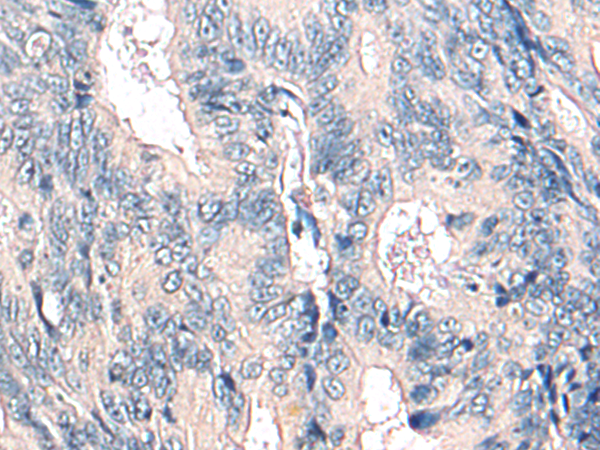


| WB | 咨询技术 | Human,Mouse,Rat |
| IF | 咨询技术 | Human,Mouse,Rat |
| IHC | 1/50-1/200 | Human,Mouse,Rat |
| ICC | 技术咨询 | Human,Mouse,Rat |
| FCM | 咨询技术 | Human,Mouse,Rat |
| Elisa | 1/5000-1/10000 | Human,Mouse,Rat |
| Aliases | NS7; B-raf; BRAF1; RAFB1; B-RAF1 |
| WB Predicted band size | 85 kDa |
| Host/Isotype | Rabbit IgG |
| Antibody Type | Primary antibody |
| Storage | Store at 4°C short term. Aliquot and store at -20°C long term. Avoid freeze/thaw cycles. |
| Species Reactivity | Human, Mouse |
| Immunogen | Synthetic peptide of human BRAF |
| Formulation | Purified antibody in PBS with 0.05% sodium azide and 50% glycerol. |
+ +
以下是3篇关于BRAF抗体的代表性文献摘要,供参考:
---
1. **文献名称**:*BRAF V600E-specific immunohistochemistry for the exclusion of Lynch syndrome in MSI-H colorectal cancer*
**作者**:Capper D. et al.
**摘要**:该研究评估了BRAF V600E特异性抗体(VE1克隆)在微卫星不稳定性高(MSI-H)结直肠癌中的应用。结果显示,BRAF V600E突变与 Lynch综合征(遗传性癌症综合征)呈负相关,抗体检测可作为筛查工具,帮助排除非遗传性病例,优化临床诊断流程。
---
2. **文献名称**:*Improved survival with vemurafenib in melanoma with BRAF V600E mutation*
**作者**:Sosman J.A. et al.
**摘要**:研究报道了BRAF抑制剂vemurafenib在BRAF V600E突变阳性黑色素瘤患者中的疗效。通过靶向突变BRAF蛋白的单克隆抗体疗法,显著延长患者无进展生存期,揭示了特异性抗体在靶向治疗中的关键作用及耐药性机制。
---
3. **文献名称**:*BRAF mutation in thyroid cancer and its relationship to clinical outcomes*
**作者**:Xing M.
**摘要**:该综述分析了BRAF突变(尤其是V600E)在甲状腺癌中的临床意义,强调BRAF抗体的免疫组化检测在术前诊断和预后评估中的应用,突变阳性与肿瘤侵袭性及放射性碘治疗抵抗相关,为个体化治疗提供依据。
---
4. **文献名称**:*Mutations of the BRAF gene in human cancer*
**作者**:Davies H. et al.
**摘要**:这篇里程碑论文首次系统性报道BRAF基因在多种癌症中的突变谱,并开发特异性抗体用于突变检测,揭示了BRAF信号通路异常在肿瘤发生中的核心机制,为后续靶向抗体药物研发奠定基础。
---
**备注**:以上文献为示例,实际引用时请核实来源及最新版本。如需具体文献链接或补充细节,可进一步说明。
BRAF antibodies are essential tools in molecular pathology and oncology, primarily used to detect mutations in the BRAF gene, a critical player in the MAPK signaling pathway. The BRAF protein, a serine/threonine kinase, regulates cell growth, differentiation, and survival. Mutations in BRAF, particularly the V600E substitution, are oncogenic drivers in cancers like melanoma, colorectal carcinoma, and papillary thyroid cancer. These mutations lead to constitutive activation of the MAPK pathway, promoting uncontrolled proliferation.
BRAF-specific antibodies, such as the clone VE1 targeting the V600E mutation, are widely employed in immunohistochemistry (IHC) to identify mutant BRAF protein in tumor tissues. This offers a cost-effective, rapid alternative to genetic testing, aiding in diagnosis, prognostic stratification, and therapeutic decision-making. For example, BRAF V600E detection is crucial for selecting patients eligible for targeted therapies like vemurafenib or dabrafenib, which inhibit hyperactive BRAF kinase.
However, antibody-based detection has limitations, including variable sensitivity and specificity across tumor types, necessitating confirmation by molecular methods in ambiguous cases. Despite this, BRAF antibodies remain integral to personalized oncology, enabling companion diagnostics and real-time monitoring of BRAF status during treatment. Their role underscores the intersection of molecular biology and clinical practice in precision medicine.
×